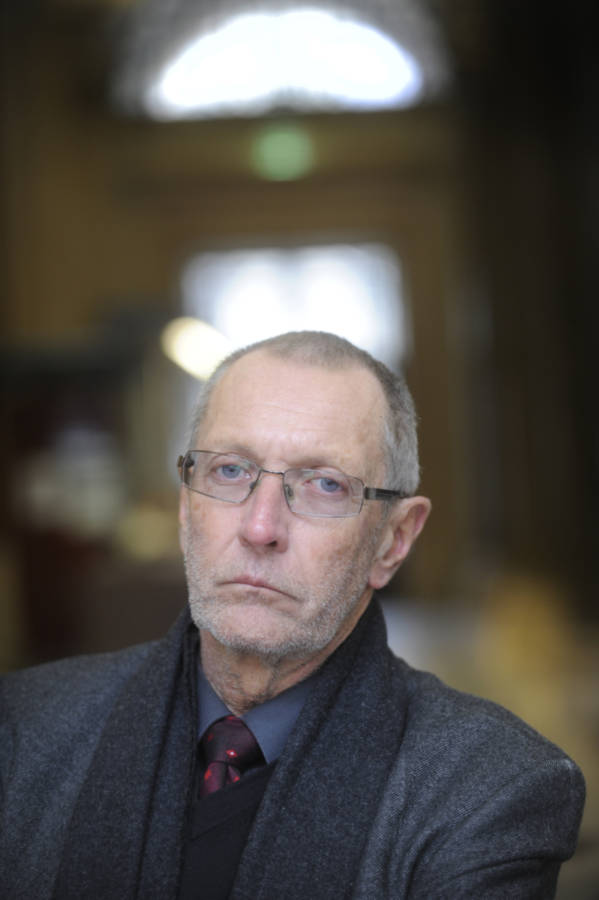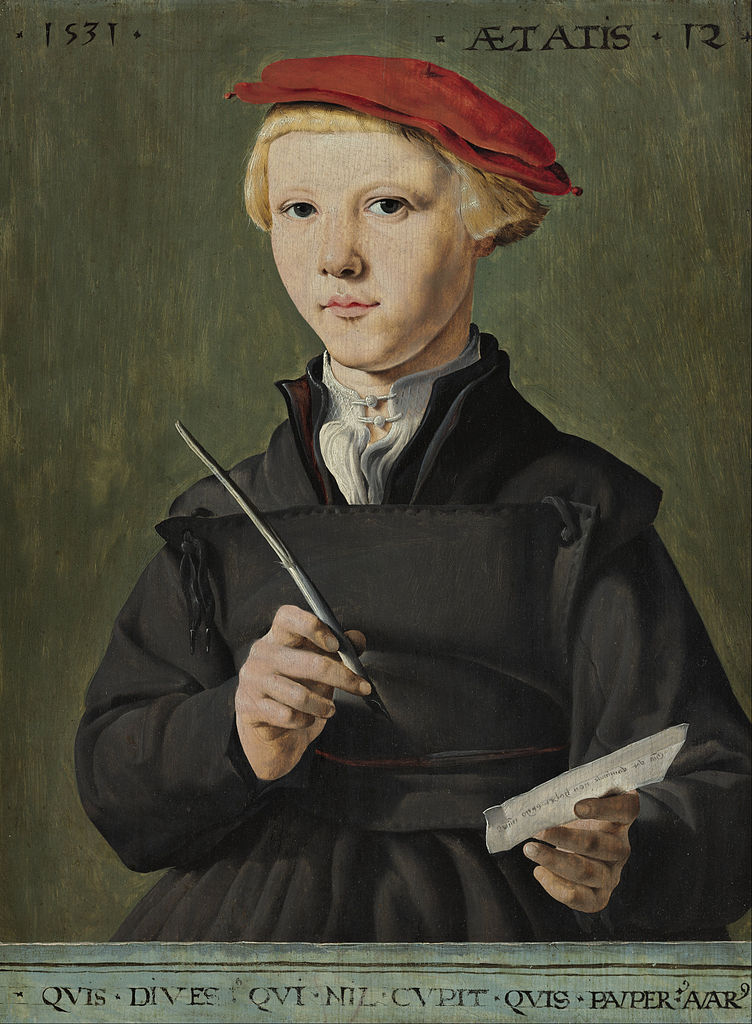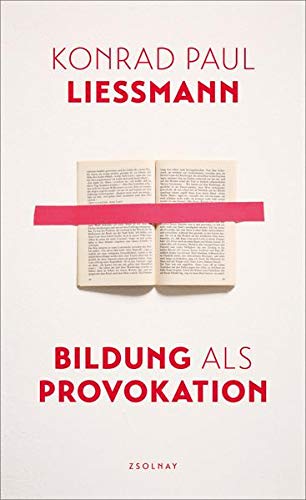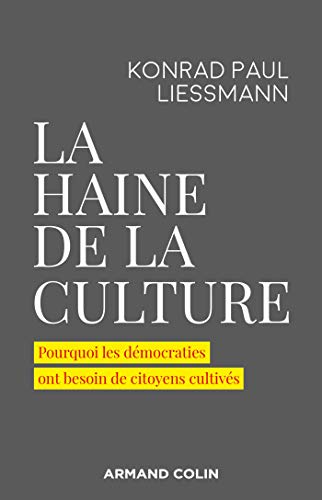This month, we are so very pleased to have a conversation with Professor Konrad Paul Liessmann, the renowned Austrian philosopher, essayist, and cultural critic at the University of Vienna.
The Postil (TP): Welcome, Professor Liessmann, to the Postil. It is a great pleasure to have you with us. Recently, your book, Bildung als Provokation (Education as Provocation) was translated into French as La haine de la culture. Pourquoi les démocraties ont besoin de citoyens cultivés (Hatred of Culture: Why Democracies Need Educated Citizens). The difference between the two titles is interesting. Could you speak to this difference? Is there a connection between education today and a “hatred of culture?”

Konrad Paul Liessmann (KPL): There is this connection. Culture, in the sense of the great works of world literature, music and the visual arts, was banned from education. The only thing that now counts in education, therefore, is competencies; dealing with the great documents of culture is hardly relevant anymore. This is also the result of a “hatred of culture,” an attitude that wants to make it easy for everyone and denounces as elitist any argument that requires concentration, knowledge and effort. That doesn’t mean that this culture should be adopted uncritically; but without this culture all education is empty.
TP: How do you understand culture?” Do you think we have lost culture?
KPL: Of course, there are the most varied of provisions of culture. One can start from a concept of culture that turns everything into culture that people somehow do regularly, ritualized and in a formed way—in this sense one can speak of a culture of beer drinking as well as a culture of war. But one could also start from a narrow concept of culture that only accepts those forms of culture in which that tendency towards reflexivity and aestheticization has become independent. That could best be called “art.” Indeed, no one wants to reduce culture to art anymore. One would rather “expand” the concept of art and allow it to coincide with the expanded concept of culture. However, it was only the elitist concept of culture that was limited to artistic activity and associated with an exquisite quality standard that made it attractive for its expansion. The fact that even the stupidest TV show wants to be culture only makes sense if you want to peck at the aura of a term that you simultaneously negate with this claim.
However, the concept of culture also suggests other interpretations and differentiations. In its original meaning, culture has, strangely enough, three opposing terms that say more about it than laborious definitions of the term culture itself: nature, barbarism, and civilization. Culture can only be determined on the basis of these and in contrast to them. Culture is originally, in its derivation, from “agriculture,” that is, worked nature. Furthermore, culture is the work on human nature. What is still raw in people, i.e., na-ture, is cultivated and refined with regard to the actual purpose of the human: autonomy and freedom. Culture always has a strong aesthetic component. Culture is always freedom from necessity, a game of fantasy and imagination, and not the practice in the practical constraints of the digitalized competitive society. In this sense, it could be that we actually lose culture because we only see everything from the point of view of usefulness.
TP: Education, of course, is the primary focus of your book. But education now means so many different things. How do you understand education?
KPL: The beautiful German word Bildung has a wide variety of meanings. Of course, this includes essential aspects of upbringing (“Education”), but the imparting of scientific, cultural, aesthetic and historical knowledge is also part of education for me. And finally, education also has a lot to do with self-education, with the formation and cultivation of mind, body and soul, with the development of dispositions and talents.
TP: There is much talk about “skills” and getting students ready for jobs (which are non-existent). Do you think universities are betraying young people because they are training them to be obsolete?
KPL: Our dynamic world no longer allows precise predictions about the world of work of tomorrow. So it is hardly possible to train young people for a certain profession. Universities shouldn’t do that either. Universities should offer a scientific education that represents a solid basis for future prospects.
TP: You offer a very pertinent quotation from the German philosopher Peter Bieri, who also writes novels under the pseudonym, Pascal Mercier – “…the educated person reads books in such a way that they change him?” Could you speak about this “change?”
KPL: Well, Peter Bieri talks mainly about reading literature, novels, short stories, poetry. According to his thesis, the reader of literature learns how to talk about the way people think, want and feel. The reader learns the language of the soul. He learns that one can feel differently about the same thing than he is used to. He learns new words and new metaphors for mental events. Because his vocabulary, his conceptual repertoire, has grown, he can now talk about his experience in a more nuanced way, and this in turn enables him to feel more differentiated. Whoever feels more differentiated, who now has words for complex feelings, has changed through reading. Reading helps to better understand other people, other situations in life, strange worlds. Precisely because this is so important in a diverse world, I don’t understand why literature is disappearing from schools.
TP: Do you think education is secular redemption?
KPL: No, I do not think so. But very often it is pretended that all the problems of our world are solved if enough is invested into education. In no area of life is there so much hope set as in that of education; there is no authority that is trusted as much as education. Education is a sought-after resource for countries with few natural resources in global competition; education is seen as a medium with which girls, migrants, outsiders, lower classes, the disabled and oppressed minorities are to be emancipated, promoted, integrated and included; and education should protect young people from being seduced by drugs, the Islamic State, and protect them from the populists. Education is supposedly the means by which prejudice, discrimination, unemployment, hunger, obesity, anorexia, AIDS, inhumanity and genocide is prevented—the challenges of the future are met and children are happy, and young sdults should be made employable: But none of that is possible. There are far too many expectations placed on education— and that is why one is always disappointed in education.
TP: Technology has given modern man much leisure time – but modern man is also forever in a rush, never having enough time for anything. Could you explain this paradox?
KPL: I think modern technology is ambivalent: it gives us freedom and makes us dependent. This also characterizes digitization. Any relief will be undone by the variety of possibilities that this technology offers and that we want to exhaust. That’s why we’re constantly rushed because we don’t want to miss anything. And we don’t want to miss anything because we no longer have any idea what is really important in our life. I hardly exlcude myself from all this. Technology has a great seductive power—we forget how much it makes us slaves to our machines. The machines should serve us and not we who should serve the machines.
TP: Will technology make institutional education unnecessary?
KPL: I do not believe that it will. The current corona crisis in particular shows how important schools and universities are. Learning is primarily a social process; meeting people is constitutive for educational processes, not working through programs.
TP: You mention the term “pseudo-scientificization of pedagogy” used by the philosopher Julian Nida-Rümelin. Could you explain what this means?
KPL: We have a fundamental problem with the scientification of professions that could be viewed more as craft, such as education. A good teacher doesn’t have to be a good scientist, and a good scientist is by no means a good teacher. Nevertheless, I believe that in a modern knowledge-society, teachers in schools need scientific training, because the sciences are the basis of teaching. The fact that so much fake news and conspiracy theories are circulating today also has to do with the fact that we don’t know enough about how knowledge is produced and communicated.
TP: You make a very powerful statement in your book—“No, education alone cannot change a society.” What led you to this conclusion?
KPL: If you will permit: the historical experience. The current balance of power is reflected in every idea of education; the hope that the youth will do better one day has still been disappointed. Social changes result from social and economic tensions, from technological innovations, and, yes, also from wars. Education alone can do little here. And yet I do not give up the hope that educated people treat themselves, treat others, treat the environment a little more carefully than is currently happening.
TP: There is a very intriguing chapter in your book, entitled, “Europe Considered as Fine Art. Towards an Aesthetics of a Continent.” How should we understand this?
KPL: The idea was, based on the famous book “On Murder Considered as One of the Fine Arts” by Thomas de Quincey, not to look at Europe from an economic, political or bureaucratic point of view, but rather from an aesthetical one. How does a colorful map of Europe from the Middle Ages, the 19th century and the present affect us? What role do the great authors from Homer to Shakespeare to Flaubert and Dostoevsky play in our conception of Europe? What significance does “absolute music” have as a genuine European invention for European consciousness? Is it a coincidence that the “European Anthem” goes back to Beethoven’s 9th Symphony? And what do metaphors from architecture, such as, the talk of the “common-house Europe” mean for our self-image? I wanted to pursue these and similar questions.
TP: You also make an essential difference between art and science. Do both exist for the “betterment” of “society?”
KPL: No. They do not exist “for” the betterment of society. Because art and science have to be free and autonomous, only then do they work well. If they are subjected to other purposes, no matter how desirable to us, art and science will be corrupted. Ideology and morality therefore have no place in art and science. But as an expression of freedom, art and science can also be a model for what a sovereign and self-confident human life could look like. But: art is not science and science is not art. Art is committed to imagination and aesthetic form, science to empiricism and rationality.
TP: In your invigorating discussion of revolution, you talk about Henning Ritter’s Die Schreie der Verwundeten (Screams of the Wounded). Why are revolutions cruel?
KPL: I don’t know. But they are. All. Every revolution has betrayed its goals and ideals. Perhaps this is due to a fatal logic: because revolutionaries believe they are on the right side of history, they consider anything to be permitted in order to achieve their goals. Whoever considers everything to be allowed because the end justifies the means becomes cruel, evil, inhuman. We must distrust revolutionaries of all shades.
TP: You call modern democracy “an administrator of poverty.” That is both a marvelous and a disturbing phrase, given the ease with which censorship is now applied and the strict control of speech (especially in English-speaking countries). Is this the result of the “mercantilization of society and life,” to use your apt term?
KPL: This question touches on several aspects. The modern, democratic state becomes an “administrator of poverty” insofar as we see it primarily as a welfare state that is supposed to alleviate the worst negative consequences of economic and ecological developments. The state is no longer a center of power, but a compensation institution. This can be seen clearly, for example, in education policy, which has actually become social policy under the keywords “equity of opportunity” and “equal opportunities.” And the state is increasingly understood as a moral institution that has to ensure that people speak correctly, think correctly, love correctly, eat rightly and act correctly. Sometimes nudging is enough, sometimes it leads to regulations and prohibitions. This undoubtedly restricts human freedom. In addition, we model our lives in principle according to the model of the market, according to the model of companies. Professors become knowledge-managers, lovers become people who invest emotions with the hope of high returns.
TP: The structure of the “political party,” you state, has fallen into a crisis as a political model. Do you think such political parties have a future?
KPL: Well, I am not advocating the abolition of parties, I just see how the traditional big parties—bourgeois parties, social democratic parties—get into a crisis and new parties emerge faster and faster, which can also quickly disappear. This has to do with the fact that people are no longer clearly defined socially and culturally. Changing interests lead to changing political representations. As the name suggests, parties correspond to a part of the whole; a democracy should be able to identify itself in the interaction of the parties. But you can imagine a democracy—as in antiquity—without parties, even without elections: you can also draw lots for important functions among the citizens.
TP: The idea of “limits” or “borders” is an important one in your thought. How should we understand these two terms, and is there a connection between borders and education?
KPL: Border in a double sense (“limit” and “border”) plays an important role not only in my thinking, but also in thinking in general. Without drawing boundaries, we cannot think; every “definition” is such a boundary. Boundaries teach us to differentiate, and boundaries mark differences. But limits are also an instruction to act: up to here and no further. And I could go on. Limits can therefore always be postponed, changed, exceeded. Borders therefore arouse curiosity; they refer us to the neighbor on the other side. This is also important for education: boundaries never divide absolutely, but they show what is here and what is there. And in a political and legal sense, borders have been invented to protect the weak. The strong do not need limits. “No borders” used to be the battle cry of aggressors. I don’t know if it’s really any different today. Of course, one shouldn’t draw rigid, inhumane boundaries. But without borders, our thinking and the world sink into chaos.
TP: “Anyone who thinks is fundamentally intolerant.” Could you explain this interesting phrase, and is the work of the intellectual still relevant?
KPL: The sentence sounds provocative, but it isn’t. The thinker is concerned with, arguable, justifiable insights, with the claim to truth. Tolerance is a wrong principle in science. As Karl Popper already taught, one has to do everything possible to falsify hypotheses and theories, i.e., to show that they are false. Theories only acquire a certain plausibility if this does not succeed. Thinking can and must be intolerant because it is not about the tolerance of other opinions, but about the search for truth. Tolerance would mean that we would no longer be able to recognize errors. That would be fatal. Intellectuals have the task of making that clear. Tolerance is only required in questions of religious belief, not in questions of scientific truth.
TP: In the final chapter of your book, you call for a “new Enlightenment.” What will this “new” Enlightenment look like?
KPL: My point is that the new Enlightenment should build on forgotten dimensions of the old Enlightenment. In this context I recall a contemporary of Immanuel Kant, the German-Jewish philosopher, Moses Mendelssohn. For Mendelssohn, enlightenment, i.e., science and rationality, was one aspect of general human education. The other side was culture, i.e., art and emotion. We have to learn again to think together the many dimensions of man. That also means that education has to educate itself about itself.
TP: Are you hopeful about the future of the West?
KPL: The philosopher Günther Anders, who spoke about the “antiquity of man,” once remarked: Hope is just another word for cowardice. If the ideas of European humanism are important to us, we should do everything we can to assert these ideas; that does not exclude criticism and self-criticism. But if we want to say goodbye to them because we are falling back into tribal structures, or want to submit to the dictates of the digital industries, we can do that too. In both cases there is nothing to hope for.
TP: Professor Liessmann, thank you so very much for your time. It has truly been a great pleasure and honor to speak to you.
The featured image shows, “Portrait of a Young Scholar,” attributed to either Jan van Scorel or Maarten van Heemskerck, painted in 1531.
Translated from the German by N. Dass.


